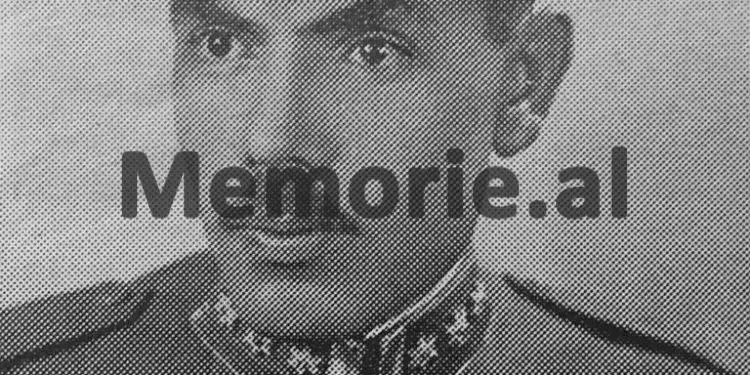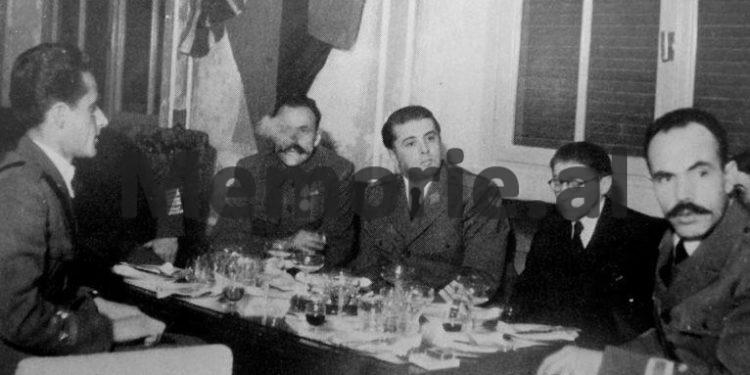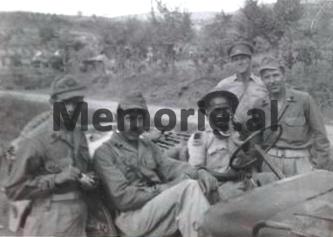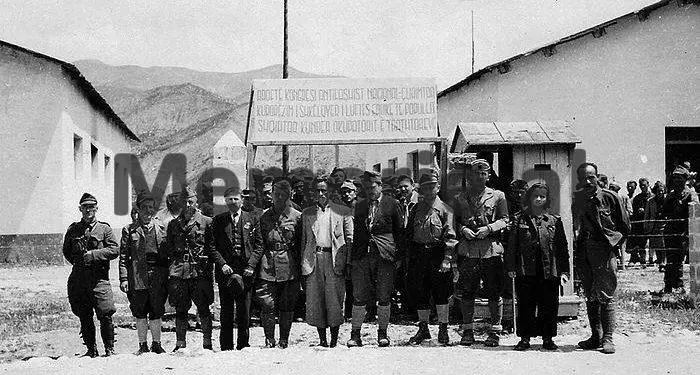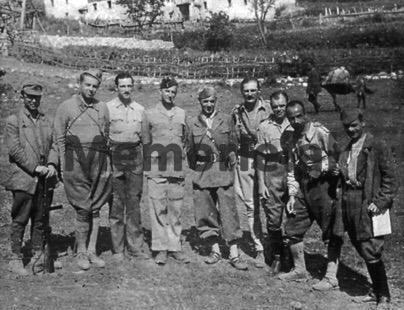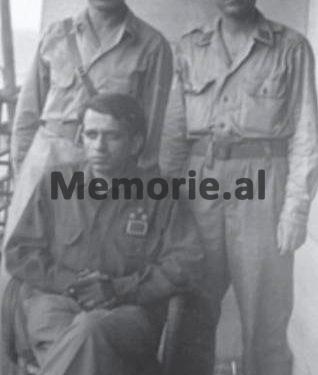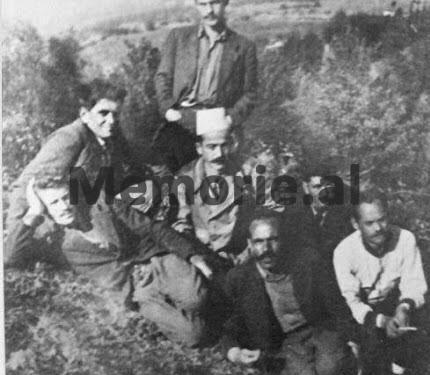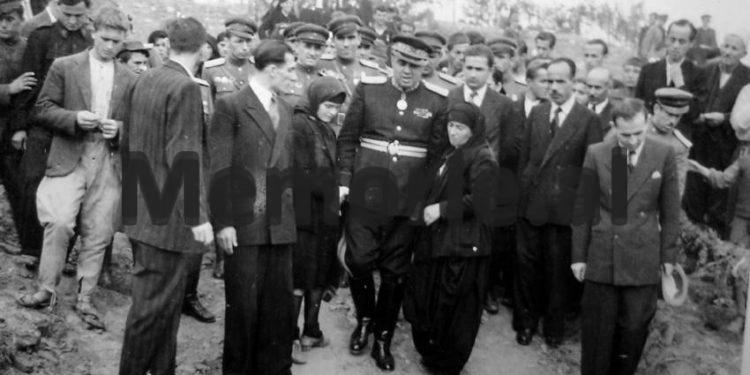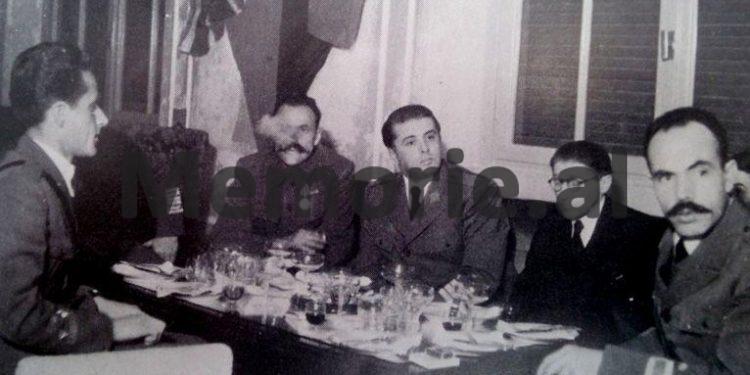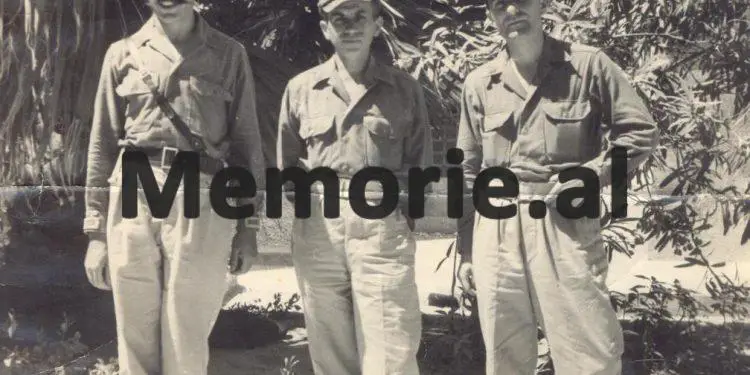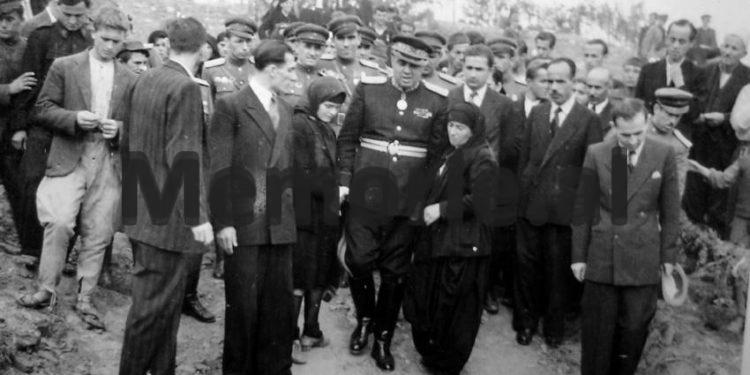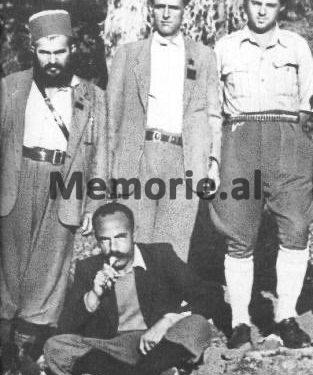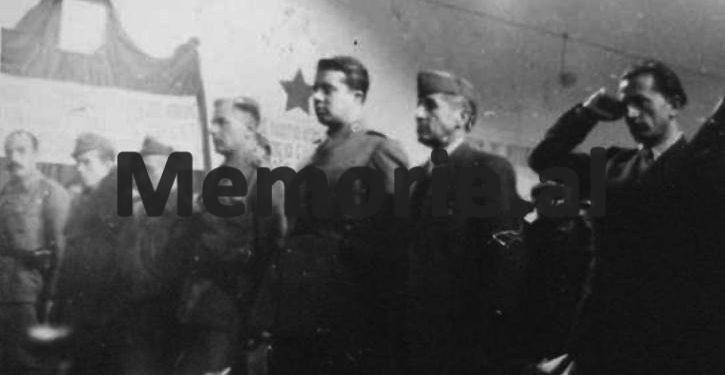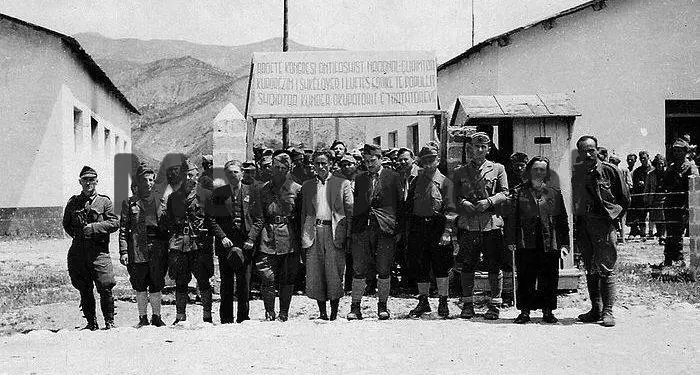Dashnor Kaloçi
Memorie.al publishes the unknown story of Ramadan Çitaku from one of the most famous families of Mitrovica, who thanks to a scholarship from the Royal government of Zog in 1930, came to Tirana and began his studies at the American Technical School of Fultz , where he came in contact for the first time with communist ideas and for the contribution and great work he had done up to that time with the ‘Communist Youth Group’ (where he was known by the nickname “Baca”), he participated in the founding meeting of the Albanian Communist Party on November 8, ’41. Çitak’s great commitment to the Anti-Fascist Movement, being a member of the General Staff of the National Liberation Army and participating in all the major events of the War since the Peza Conference, the Labinot meeting, the Pwrmet Congress, the Plenum and the Berat meeting, where he was elected Minister of Finance in the first government headed by Enver Hoxha, as well as the function of Plenipotentiary Ambassador of Albania in Belgrade, where he served until the breakdown of official relations between the two countries. The removal of Çitak by Enver Hoxha being sent to work as the Director of the Savings Bank, as he considered him a ‘Yugoslav man’ and the abandonment and leaving in his “oblivion” by his comrades-in-arms and the ideal, until 1990, when he passed away, as Enver and Nexhmija had not accepted his request to be treated abroad!
“As long as we stayed there at the headquarters of the Albanian embassy in Belgrade, we were both under strict surveillance by the UDB and our phone rang at any moment, and as soon as they heard his voice, they hung up! This was done to make sure “Baca” was there. When we returned to Tirana, Enver Hoxha called Ramadan to the Foreign Ministry and asked him where Tito was. He replied that he did not know anything, but the Yugoslav press reported that Tito was resting at his residence on Lake Bled in Slovenia. After these words, Enver got angry with Ramadan, saying: “what did you do there, when I do not know where Tito is”?! This is how he remembered the meeting of “Baca” with Enver Hoxha, Hatixhe Deliu, the wife of Ramadan Çitaku, one of the personalities of the Anti-Fascist Movement in Albania, former founder of the Albanian Communist Party in the meeting of November 8, ’41, member of the General Staff of the National Liberation Army and participant in all the main events of the War, since the Peza Conference, the Labinot meeting, the Përmet Congress, the Plenum and the Berat meeting where he was elected Minister of Finance in the first government, etc., who after The breakdown of official relations between Albania and Tito’s Yugoslavia would be dismissed by the powerful ambassador to Belgrade and removed from Enver Hoxha and “forgotten” by his comrades-in-arms and the ideal, even until April 1990, when he passed away, few knew he had lived up to that time! For more about this and the whole life story of Ramadan Çitaku, we will get to know each other in this article, through the testimonies that Memorie.al has taken from the Çitaku family.
From Mitrovica, to Fultz ‘Technique’ in Tirana
Ramadan Çitaku was born on February 14, 1914, in the city of Mitrovica, where the Çitaks were known at that time as one of the largest and most famous families of that province. Ramadan’s father, Hasan Çitaku, was a target of Azem Galica’s gang, and Hasan’s younger brother (Sinani) was also in that gang, while their older brother, Ibrahimi, was killed in the war with the Serbs. Ramadani received his first lessons in the city of Mitrovica, where he managed to do two years of high school, while in 1930, he decided to leave Kosovo and come to Tirana, to continue the American Technical School, otherwise known. as the ‘Fultz School’. In Tirana, where Ramadan came in the summer of 1930 from distant Mitrovica, there was no family to welcome him and no support. Based on this, before the start of the new school year, he entered as a worker on a farm on the outskirts of Tirana, to provide some income that he would need with the start of school. Alone, without any assistance, he went through several offices of the administration of that time, until he managed to secure a state scholarship, to start classes at Fultz American High School, a scholarship which was awarded to him in the framework of a favor made by the government of that time, to come to the aid of students from Kosovo. Among the peers with whom Ramadan had the most friendship in that school, were Sadik Premtja from Vlora and Anastas Lula from Kolonja, while among the students who had come from Kosovo, was Sadik Staveleci, Ramadan’s closest friend. In that social circle in the ranks of the Technical School, Ramadan came into contact for the first time with the communist ideas that had begun to spread at that time, especially among the youth of the main cities of the country. After graduating from this school in 1934, Ramadani was assigned to work as a Geometric Technician in the Municipality of the city of Durrës and during the time he served there in that profession, he met and formed a close friendship with Nako Spiro. Together with Nako, in that city, Ramadani did a great job of spreading communist ideas, mainly to school youth. On April 7, 1939, when Benito Mussolini’s fascist Italy carried out military aggression against Albania, Ramadani continued to work in the road maintenance sector in the Preza area, as a surveyor.
At the founding meeting of the SNP on 8 November ‘41
Meanwhile, with the consolidation of the Communist Youth Group, which consisted mainly of students of the Fultz Technical School, Ramadani was one of the main exponents of this group, after Sadik Stavelec, Sadik Premtes, Anastas Lula, etc. The work that Ramadin had done in Durrës with Nako Spiro, made him gain a good name and he was proposed to go as a representative of this group in the founding meeting of the Albanian Communist Party, on November 8, 1941. In that meeting founder, Ramadani, or as he was otherwise known by the nickname “Baca” (as the old men in Kosovo were called), unlike his comrades in the Communist Youth Group (Sadik Premtja by Anastas Lula), “Baca”, was the thesis defended by Enver Hoxha and some of his followers, to form the Communist Party once, then to settle the disputes that the groups had between them. After the founding meeting of the Communist Party, Ramadani, one of the seven members of the Provisional Central Committee of this party was elected. The tasks assigned to Ramadan after the founding meeting were to work in the Elbasan Region, together with Kadri Hoxha (“Lila”) to strengthen and spread communist ideas in that area. In the Elbasan Region, Ramadani, together with Kadri Hoxha, found the support of some well-known and very popular people, such as Ali Shtëpani and Baba Faja Martaneshi, who helped them set up the first partisan factions in the area, such as that of Çermenika and Martanesh. It was “Baca” with Kadri Hoxha, who managed to approach in the ranks of the Antifascist Movement one of the most famous and respected figures of that area, such as Baba Faja Martaneshi, and not Enver Hoxha, who in his memoirs, years later when he wrote his memoirs in the early 1980s, in the book When the Foundations Were Laying, he attributes it to himself.
At the Peza Conference and the Labinot meeting
After a great deal of work that “Baca” did in the area of Elbasan, he is assigned to go as a delegate to the Peza Conference, as a representative of the Albanian Communist Party and mandated by it to meet with nationalists. After Koço Tashko, one of the creators of that conference, the second one who would support this action more (ie the meetings with the nationalists, to bring them closer to the ranks of the Anti-Fascist Movement), would be “Baca”. He would even deal with the technical details of the meeting and Çitaku, based on the instructions he had received from Koço Tashko, went to Elbasan to meet with former Prime Minister Shefqet Vërlaci, inviting him to a meeting with nationalists. to be held on September 16, 1942. But Vërlaci, made it a condition to accept for negotiations only Ramadan Çitaku, from the whole group that had been appointed by the communists to talk to him and he received Çitaku at his residence in Elbasan. After the end of the Peza Conference, Ramadan Çitaku, sent by the Albanian Communist Party, would hold many meetings, in different areas of the country, from north to south. At the Labinot Conference (variously known as the first SNP Consultation) held in March 1943, he was elected a member of the Central Steering Committee of the Albanian Communist Party. At the same time, only five months later, Çitaku was elected to the General Staff of the National Liberation Army, at the meeting of July 10, 1943, held in Labinot.
Minister of Finance in the first government in Berat
Looking at the figure of Ramadan Çitaku, a serious, calm, and influential man, the Albanian communists would choose him, in all the senior leadership forums of this party, since its founding in 1941. Thus, he was elected at the Labinot Conference as a member of the General Antifascist National Liberation Council, as well as a delegate to the Përmet Congress. At that congress, he would take up the rank of colonel and was elected a member of the General Antifascist Committee that had the attributes of an interim government. After the Përmet Congress, “Baca” also participated in the Berat Plenum, where during the formation of the provisional government, he would assume the post of Minister of Finance. But in that plenum, the beginning of the political blow against him would start. As a result of the great influence of Yugoslav emissaries, such as Colonel Velimir Stojnic and Njaz Dizdarevic at the head of the SNP, “Baca” would be provisionally expelled from the Central Committee (until a second decision), as they accused him of was defending Enver Hoxha’s line at that meeting, where “Tarasi” was severely accused by them. In this regard, years later in his personal memoirs (which would be seized by order of Enve Hoxha, under the pretext of ‘sending them to the museum stands’), among others, Çitaku wrote: “In that plenum, where I was severely beaten by the Yugoslavs because I defended Enver, I had no support. Even Enver Hoxha himself, who had to do that, did not defend me there “?! The attacks and blows inflicted on Ramadan Çitaku in the Berat Plenum, came because he was well known by Velimir Stojinic and Nijaz Dizdarevic who considered him one of the most trusted people of Enver Hoxha, because together with Vasil Shanton, on behalf of the SNP, they had traveled several times to Macedonia, Kosovo, and Montenegro to obtain contacts with the main communist leaders of those countries. At the end of the war, on the pretext that “Baca” knew English very well (after graduating from the American Fultz school in Tirana), to avoid it, Enver Hoxha sent Çitaku to Italy, as a member of the Albanian Military Mission to the Command Anglo-American ally of the Mediterranean in the center of Bari, where he served for some time together with Bedri Spahiu, Halim Budon, etc.
Divergences with Enver Hoxha
Although Ramadan Çitaku was expelled from the Central Committee of the Albanian Communist Party in Berat, he would continue to hold the post of Minister of Finance, until October 1946, when he would be replaced by Kiço Ngjela. In the parliamentary elections of December 2, 1945, Çitaku would be elected as a deputy of Elbasan, and the Constitutional Assembly would elect him as a member of the Presidium of the People’s Assembly. In 1947, he would be appointed Ambassador Extraordinary and Plenipotentiary of Albania to the Federal Republic of Yugoslavia, headed by Marshal Josif Broz Tito. A year before he went to Belgrade as the powerful minister of Albania (in 1946), “Baca” would marry the communist from Chameria, Hatixhe Deliu, who was also one of the activists of the first hours of the Anti-Fascist Movement. Regarding this, Khadija recalled: “When we got married, they put us in a house, on ‘Elbasani’ Street near the ‘Kosova’ school, and as a minister who was Ramadan, they brought us some old furniture to furnish the house, which “They were seized from the former director of the National Bank. But they were inappropriate for us and Ramadan rejected them, saying that everything for his family would be done by his personal contribution.” As ambassador to Belgrade, he would replace Tuk Jakova, but Citaku would not stay in this post for more than a few months, as in 1948, relations between Tirana and Belgrade would break down. Regarding this, Khadija recalled: “As long as we stayed there at the headquarters of the Albanian embassy in Belgrade, we were both under strict surveillance by the UDB. Our phone rang at every turn and as soon as they heard his voice, they hung up. This was done to make sure “Baca” was there. When we returned to Tirana, Enver Hoxha called Ramadan to the Foreign Ministry and asked him where Tito was. He replied that he did not know anything, but the Yugoslav press reported that Tito was resting at his residence on Lake Bled in Slovenia. After these words, Enver got angry with Ramadan, saying: ‘what did you do there, when I do not know where Tito is’?! He responded by saying, “It was not his job to control Tito.” This came after we had broken up with the Yugoslavs and Ramadan knew nothing about the matter, as no one had officially informed him. After this heated conversation, Enver Hoxha asked Ramadan to prepare in writing all his activities as ambassador and the meetings he had with Tito and other Yugoslav leaders. “Baca” would be shocked by this and asked Hoxha the reason why he should do this?! Enver responded, saying: “This would serve as clear evidence that Tito has betrayed the SNP and its main leadership.” But Ramadani, in vain, tried to explain to Hoxha the reasons why Tito had betrayed Moscow and not Tirana. Even after that, Enver Hoxha did not give explanations, but advised him to finish this material and settle down at the “Dajti” hotel. After that, thinking that Ramadani was a Yugoslav man, he removed him from all leading positions he held in the Albanian Communist Party and appointed him as a simple clerk in the Ministry of Finance. After this post, Ramadan Çitaku, is appointed General Director of the Savings Bank and during all the time he served in that position, he was under strict surveillance by the State Security bodies!
The most difficult period of “Baca”!?
After his expulsion from the party, a difficult period would begin for Ramadan Çitaku. In addition to the post of director of the Savings Bank, he was denied the right to be in the senior management forums of the SNP, where he had served since its founding in November 1941. He was initially barred from any correspondence with his family in Kosovo, but after Mehmet Shehu came to head the Ministry of Interior, the latter asked Çitaku to write a letter to his family in Mitrovica… It is not known why Shehu asked Baca personally, but according to the testimony of his wife Khadija, this may have been done to test Çitak’s pulse. In that letter, he would urge his family to rise up publicly against the Tito regime. When this letter fell into their hands, Ramadan’s father, Hasan, after reading it in the presence of the whole family, tore it up, telling them: “Ramadan to look at his troubles in Tirana, that our troubles we know them here. ” (This event, Ramadani could learn from his brother, when the latter came to Tirana in 1981). Meanwhile, two of his relatives who had received the same letter were arrested by the UDB and imprisoned. Meanwhile, in 1952, by order of Kadri Hazbi, Qerim Uka would go to Çitak’s house, who would tell him: “Bacë Ramadani, after a few days a group of Albanians will flee to Yugoslavia and they will “Rrok Cupreli will lead them. Why don’t you go with them too”?! Çitaku understood the provocation and strongly opposed it. Then Uka addressed Ramadan, saying: “But why did you break up with the government, you Bacë”?! This message was clear to him. According to the testimony of his wife, Enver Hoxha, he wanted to sacrifice Ramadan Çitaku as a ‘bait’, forcing him to flee, to finally hit his figure, accusing him of being in the service of Yugoslavia. At that time, Ramadan, there were signals from people fleeing Kosovo to Albania, who stated that the official Yugoslav press said: “Ramadan Çitaku, former senior exponent of the Albanian Communist Party, former minister in the first government of Enver Hoxha and former ambassador of Albania in Belgrade, is mistreated by the communist regime of Enver Hoxha, so much so that he is forced to sell peanuts at the cinema “Partizani”, in Tirana, to ensure his livelihood. , Ramadan Çitaku, is finally called to the office by Enver Hoxha, who declares: “Baca, we have been forced to observe you strictly for four years, but you have been a real Bolshevik and as such you will always remain.” this statement, Çitaku, was readmitted to the Labor Party and would work as director of the Savings Bank, for years, being considered a “victim of Koci Xoxa”!
He asks Enver to go out for treatment, but he gets no answer!
From 1952, when Çitaku was readmitted to the Labor Party, he would continue to work as director of the Savings Bank, until 1974, when he retired, and throughout that long period of time, he not only did not receive never took part in any official activity commemorating the events of the War, as he was never invited, but never left the house, except when going to work and vice versa. Thus, he was forgotten and completely sidelined, by his former War comrades, many of whom did not even know if he was still alive. In 1960, Çitaku became seriously ill and Dr. Paparisto advised him that he should be operated on urgently in a specialized clinic. After that, seeing his very serious condition, he wrote a letter to Enver Hoxha, asking him to go abroad, to have an operation, because at that time Albanian medicine, according to the advice of Dr. Paparistos, could not perform that surgery. But from the Albanian communist leader, Çitaku, he would not receive any answer! In the summer of 1961, Enver Hoxha, by chance, meets Ramadan at the Workers’ Holiday Camp in Pogradec where he had gone for a visit and as soon as he came face to face with “Baca”, he asked him how he was with his stomach, which indicated that he had received the letter that Çitaku had sent to him some time ago, in which he asked them to take him out to cure him. After this brief meeting, “Baca” no longer had the opportunity to meet with Enver, although he “removed the olive mourning” even to get a camp leaflet to rest in Pogradec in the Workers’ Camp.
Abandoned and forgotten to death, in April ’90
Around 1981, after Enver Hoxha had published the book “When the Party Was Born”, and was obliged to mention extensively the contribution of Ramadan Çitaku in the period of the founding of the Albanian Communist Party, he was also forced to call “Baca” as invited to attend the VII Congress of the ALP. After this invitation, only Haxhi Lleshi got on the phone and called him several times to visit his villa where he lived outside the “Block”, which was not followed by any of the “leadership comrades” who lived in the “Block”! “Baca” even though he felt that he was indirectly avoided and abandoned by his former comrades-in-arms and the ideal, he never gave himself up, being guarded by many provocateurs who even went home. On April 9, 1990, when a short obituary was officially announced in ‘Zeri i Popullit’ announcing the death of Ramadan Çitaku, many who would read those few lines were amazed at how the man was treated. that had been written so much, especially by Enver Hoxha in his latest books (‘When the Party was born’, ‘When the foundations were laid’, etc.), had been alive up to that time!?
Nexhmije refuses to help him, when “Baca” was on the verge of death!
Shortly before Ramadan Çitaku passed away, his wife, Khadija, asked Nexhmije Hoxha (her former war friend) to help her, considering the possibility of treating “Baca” in a clinic abroad, but never got any response from her! When Sokoli, (the second son of Enver and Nexhmija) who worked with the son of “Baca” at the Albanian Post, went to the Çitaku family for consolation, with much sincerity and kindness, even as guilty, he told them: ” I had told Nexhmija your request for “Baca” to be treated abroad and let her bear the responsibility “! After two or three days, Nexhmije Hoxha was forced to go to the Çitaku family for consolation and during the few minutes he stayed there, he told them: “It is true that my son, Sokoli, answered your request for” Baca “. to cure him outside, but from the many chores and heavy workload I had with selecting a few memories of Comrade Enver urgently sought by my Party comrades, I forgot. “Sometimes we leave these jobs like this and we are forced to do so only when people die,” she told the family of “Baca”, her former comrade-in-arms from the Peza Conference, when she met him first time! /Memorie.al




